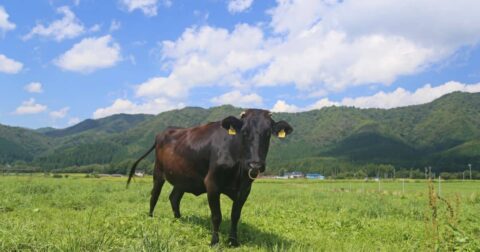Reported
Cargill Meat Still Contains Critical Antibiotics, Investigation Finds
Food•5 min read
Explainer
Wagyu beef is one of the most expensive — and consistently mislabeled — foods on the market. In this explainer, we look into what the "wagyu" label means for the cows.


Words by Björn Ólafsson
There are few types of food more synonymous with luxury than ”wagyu.” Translated from the Japanese, the word means “Japanese cow.” On the market, wagyu beef can fetch anywhere from $99 a pound at Costco to upwards of $200 — with one cow selling for as much as $30,000. The lore around “wagyu” may have led to its expensive mystique, as stories of cows massaged and fed beer circulated for decades. But the reality is the wagyu in wagyu beef only refers to how the cow is bred, not the way the cow is treated, and fraud runs rampant in the industry. Here we explain just what wagyu means, and what it doesn’t, especially for cows.
Wagyu cows originate from Japan, a country that was particularly isolated from the world between the 17th and 19th centuries. As a result of this seclusion, cows were not able to crossbreed, and so most Japanese cows retain unique genetic qualities. Early on in the 20th century however, the country’s cows were permitted to crossbreed with foreign cattle. By 1944, researchers categorized Japanese cattle into the four breeds the country is known for today.
In the 1990s, the Japanese government banned the export of wagyu cows as they considered them a living national treasure. The meat, however, was not banned from export, though beef producers outside of the country have also begun raising wagyu cattle.
American meat companies began producing and selling wagyu beef products in 1994, eventually creating trade associations such as the American Wagyu Association. Over time, the USDA created different labeling standards for wagyu beef. “Wagyu Fullblood” is from a 100 percent wagyu cow, while “Wagyu Purebred” can be genetically 93.75 percent or more wagyu.
Wagyu cows must also amass more fat than other cattle before slaughter — wagyu beef can be more than 30 percent fat in some instances — which also takes more time, sometimes twice as long to raise than other types of cattle. Strict genetic requirements, low availability of purebred wagyu cows and the time involved are all factors driving up the steep cost of wagyu beef. But what isn’t driving up prices is better treatment of the cows sold as wagyu beef.
American wagyu beef companies have long claimed that their cows are humanely treated, however, very few wagyu operations have been certified by humane meat or animal welfare associations.
Wagyu steaks are considered most delicious when the ratio of fat to muscle is high, meaning farmers need to minimize muscle growth to create fatty adipose deposits. The simplest way to prevent muscle growth is to inhibit the exercise cattle would get from roaming outside, which has led many wagyu farmers to house their cows in tight quarters while making them eat as much as possible.
Many aspects of wagyu beef production are the same as conventional beef production, though the longer production timeline can mean a longer life, though the quality of that life is, again, not guaranteed or even subject to much government ovresight.
The bottom line is that buying wagyu beef is no guarantee of high animal welfare standards, nor does it even mean that you’re getting beef from a wagyu cow. Serious Eats called wagyu beef one of the most consistently mislabeled foods in the U.S.
While animal welfare reports on wagyu farm standards are scarce, we know wagyu steaks are fattiest when cows are raised in barns with minimal grazing time. According to the research on raising wagyu beef, most cows are “permanently housed in small pens and fed enormous quantities of concentrate and comparatively little roughage.” Eating a wagyu steak is therefore not any guarantee that the animals were treated humanely.
Wagyu cows are typically slaughtered in the same way that conventional cattle in the U.S. are killed — by driving a metal bolt to render the cow unconscious before slitting their throats. However, this requires precision, and due to fast disassembly lines, up to one out of every eight cows is not stunned properly before slaughter. If left un-stunned, cows go on to endure the horrifically painful experience of exsanguination — or bleeding out to death while conscious.
Kobe cows are one of the four main Japanese cow breeds, and a subset of wagyu cows that are quite popular in the United States.
No, wagyu cows can and are farmed in many countries, including the U.S. and Australia. Cows are deemed wagyu only if they are descended from the four Japanese cow breeds, regardless of where the cows are raised.
Popular myths abound regarding the treatment of wagyu cows — some claim they are massaged and brushed daily, or even given classical music concerts to relax them.
Myth: Wagyu cows need massages.
Fact: The massages originated in Japan during winter months to relax the muscles when the cows were unable to graze outside. Most farms today do not need to resort to muscle massages, as they have ample grazing area to keep the cows relaxed and happy.
Myth: Wagyu cows are fed beer.
Fact: Some farmers may feed their cows beer residues (without alcohol of course), but this practice is not necessary or standardized.
Myth: Wagyu beef is more sustainable than conventional beef.
Fact: Whether wagyu or not, beef is not sustainable for the environment. It uses massive amounts of land to produce feed, and the cows emit methane that worsens climate change.
Despite the high price point, cows raised as wagyu beef are not necessarily treated any better than other farmed cows. Beef is also one of the least sustainable foods humans eat, responsible for over a quarter of all food-related emissions. Eating less beef and a more plant-rich diet is one of the most effective ways of reducing your impact on the planet.